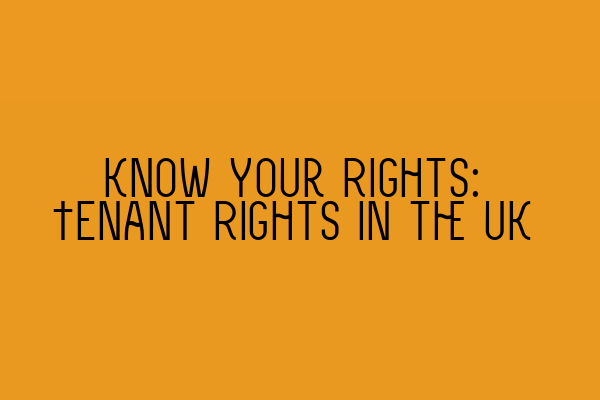Know Your Rights: Tenant Rights in the UK
As a tenant in the UK, it’s essential to know your rights to protect yourself and ensure a smooth rental experience. Understanding your rights not only helps you avoid any potential disputes with your landlord but also empowers you to assert your legal entitlements confidently. In this article, we will discuss the key tenant rights in the UK that you should be aware of.
1. Right to a Written Agreement
First and foremost, all tenants in the UK have the right to a written tenancy agreement. This agreement is a legally binding document that outlines the terms and conditions of your tenancy, including the duration, rent amount, and any special provisions. It is crucial to thoroughly read and understand the agreement before signing.
To learn more about the legal implications of contracts and the potential pitfalls of misrepresentation, check out our article on Misrepresentation in Contracts: Unveiling Deceptive Practices.
2. Right to a Safe and Habitable Property
Your landlord is responsible for providing you with a safe and habitable living environment. This means that the property should meet certain health and safety standards, including adequate heating, proper sanitation, and functioning electrical and plumbing systems.
If you believe that your rental property is not meeting these standards, you have the right to request repairs or improvements from your landlord. If they fail to address these concerns promptly, you may be eligible for rent reductions or even the termination of your tenancy.
3. Right to Privacy
As a tenant, you have the right to enjoy peace, quiet, and privacy in your home. Your landlord should not enter your property without providing reasonable notice, except in cases of emergencies. It’s important to understand your privacy rights and communicate with your landlord to maintain a respectful tenant-landlord relationship.
4. Right to Protection from Unfair Evictions
Under the UK law, landlords cannot evict tenants without valid reasons and following the proper legal procedures. If your landlord wants to evict you, they must provide a notice of eviction, typically in the form of a Section 21 or Section 8 notice.
It’s crucial to know your rights when it comes to eviction and understand the specific conditions under which your tenancy can be terminated. Seeking legal advice from a qualified solicitor in case of any eviction concerns is always recommended.
5. Right to a Deposit Protection Scheme
When you pay a security deposit to your landlord, it should be placed in a government-approved deposit protection scheme within 30 days. This scheme ensures that your deposit is safeguarded and returned to you at the end of your tenancy, provided there are no damages or outstanding rent.
6. Right to Fair Rent Increases
Landlords in the UK have the right to increase rent, but they must follow specific guidelines and provide proper notice. Generally, rent increases can only occur once a year and must be reasonable. If you believe that your landlord is unfairly increasing your rent or not following the proper procedures, it’s essential to seek professional advice.
7. Right to Challenge Unfair Terms
If you encounter unfair terms in your tenancy agreement or believe that your landlord is treating you unfairly, you have the right to challenge these terms. It’s important to remember that certain terms may not be legally enforceable, and you have the right to dispute them.
To expand your knowledge of contract law and explore landmark cases and influential judicial decisions, have a look at our comprehensive article on SQE Contract Law: Analyzing Landmark Cases and Influential Judicial Decisions.
Conclusion
Understanding your rights as a tenant is crucial for a positive rental experience. By knowing your entitlements and legal safeguards, you can navigate any disputes or issues that may arise during your tenancy. If you have any concerns or questions regarding your tenant rights, it is always recommended to seek professional advice from a qualified solicitor who specializes in property law.
For more information on various legal topics, including contractual capacity, interactive mock tests for contract law, and joining our SQE contract law webinars, visit our website at SQE Property Law & Land Law.
